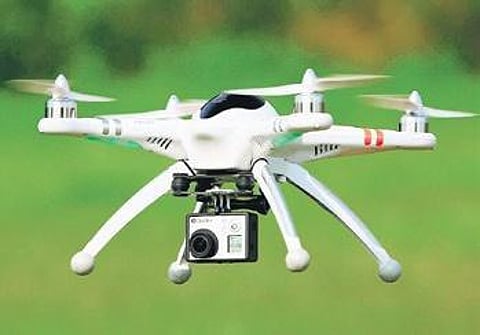

HYDERABAD: In a major boost to the State’s plan to deliver medicines through drones, one of the shortlisted startups for the project recently received a green light from the Ministry of Civil Aviation for conducting Beyond the Visual Line of Sight (BVLOS) flights.
In a letter written by a senior official of Ministry of Civil Aviation, Hyderabad-based Marut Drones, one of the startups the State government is in talks to conduct medicine deliveries and surveil forests through drones, were given approvals for conducting BVLOS trial flights. This permission gives the right to the startup to operate drones remotely and let it function beyond the limits of the horizon.
“Once they conclude the trials (at least 100 hours of flight time over three months) and submit the test results, it will lead to the drafting of India’s first ever BVLOS standards and protocols in collaboration with academia and industry,” read the letter accessed by Express. Apart from Marut, two other Hyderabad-based startups, Value Thought and Centilion also received the approvals.
Other startups which have been accorded approvals are AIDAT, ANRA-A, Asteria, AutoMicroUAS, ClearSky, Dhaksha, Dunzo Air, Sagar Defence, Saubika, ShopX Omnipresent, Skylard, SpiceXpress, Terra Drone Consortium B, The Consortium, Throttle Aerospace and Virginia UCAL. Earlier, State government officials had said that they would approach the Directorate General of Civil Aviation for amending these rules and for special permissions. Apart from BVLOS, current drone regulations also do not allow unmanned aerial vehicles to “discharge or drop substances” unless cleared by authority.
Marut Drones co-founder Prem Kumar Vislawath said, “Medical Delivery drone is accessible through a mobile app and will help penetrate remote areas which are inaccessible. PHCs can get daily supplies at the press of a button within few minutes be it blood, vaccines, diagnostic medical samples or long-tail medicines.”
Explaining about the delivery model, he said, “The delivery works on a hub-and-spoke model. The team gets a message on the inventory needed. This is loaded at the central hub, and the drones take off, after the regular pre-flight tests and checks of wind conditions, audio pilot systems, and GPS tracker. The coordinates are fed into the systems and the health examiner picks up the vials at the drop-off point.”